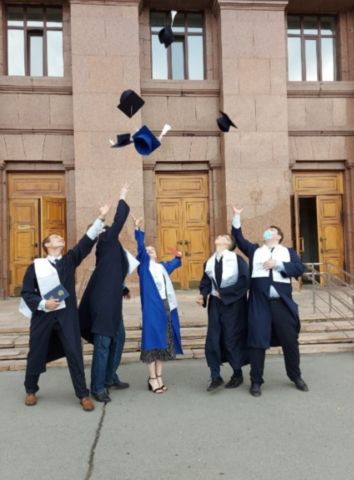In the context of a rapidly changing reality, the need that society has in professionals with comprehensive competencies, most of which are somehow related to the search and consumption of information, remains a fundamental constant. In this regard, obtaining a completed higher education will help young people not to “drown” in the conditions of modern “information surfing”.
Of late, higher education in our country is no longer considered complete without a Master’s degree. In addition, Master’s degree programmes in many ways serve as a “plan B” in a situation where a student decides to change the field of study. It is no secret that many applicants, when applying for a Bachelor’s degree, have doubts regarding their chosen professional vector.
The Department of Russian and International History of the SUSU Institute of Media, Social Sciences and Humanities invites to study in a Master’s degree programme in History. This programme offers classical humanitarian education. In the process of training students learn to think critically, acquire a broad outlook and erudition, what further contributes to the successful implementation of social and humanitarian knowledge in any field.
Duration of training in the 46.04.01 History. Modern Historical Research: Theory and Practice (state-funded/ contract-based) Master’s degree programme is 2 years and 3 months (full-time/part-time mode of study). Head of the programme is Olga Nikonova, Doctor of Sciences (History), Associate Professor, Head of the Department of Russian and International History.
The Master’s degree programme is aimed at training qualified personnel in the field of research and pedagogical work in History. The advantage of the programme is the combination of studying and scientific research throughout the entire course of the programme.
Combination of theoretical research base and practical application of the skills acquired during the process of training increases the competitiveness of graduates in the labour market. Modern world dictates the demand for specialists with such abilities as outside-the-box thinking, the ability to adapt to external conditions, communication skills, initiative and creative thinking.
Starting from 2018, the department has been implementing a project on creating an Internet resource called Historical Reconstruction of Chelyabinsk. The purpose of the project, according to its participants, is not only to preserve the historical and cultural heritage in a digital form, but also to mediate between citizens and the scientific community that preserves the historical heritage of Chelyabinsk. Popular-science historical content will serve for the purposes of forming an attractive image of the city for its residents and visitors.
In addition to this project, the educational function of the department includes active collaboration with the State Museum of the South Ural History, Centre for Historical and Cultural Legacy of Chelyabinsk, State Archive of the Chelyabinsk Region, and Archeos Paleopark.
According to Master’s degree programme graduate of this academic year Daniil Chernysh (group СГ-236), one of the main distinctive features of studying in the Master’s degree programme in History are the favourable conditions for active application of the acquired theoretical knowledge in applied activities.
“For those who are interested in history, the Institute of Media, Social Sciences and Humanities provides a unique opportunity to study not only in the Bachelor’s degree programme, but also in the Master’s degree programme. Students who enrol in the Master’s degree programme will be able to deepen their knowledge in the field of History of Russia, master modern methodological approaches, and try their hand in project activities. Small groups allow the academic staff members to build an individual approach to learning and an educational trajectory for each student. Acquired knowledge and skills will allow graduates of the Master’s degree programme to successfully build their career in the professional field,” sums up Associate Professor of the department Tatiana Raeva.
Admissions exams consist of checking general cultural competencies (test), an examination to test professional competencies in the form of an oral examination on the History of Russia.
Detailed information about enrolling is available on the website of the department in the Applicants section.
Consultation on the programme can be obtained at: Room 509 of the SUSU Main University Building, 76 Lenin Prospect, Chelyabinsk, tel. 267-91-25, 267-92-15, e-mail: nikonovaoi[at]susu[dot]ru




